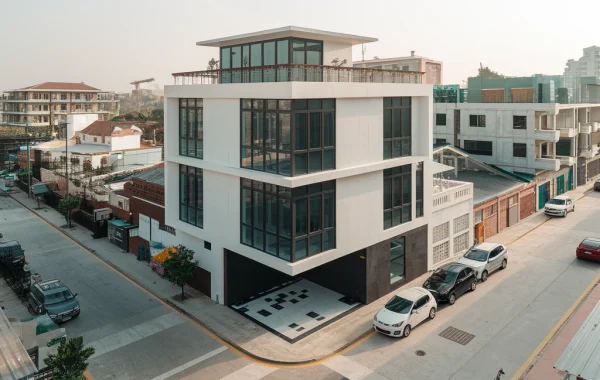
Common Pitfalls When Buying Property in Accra and How to Avoid Them
Accra’s real estate market offers exceptional investment opportunities with 8-11% rental yields and projected growth of 5-10% annually. However, rapid market expansion has created significant risks for unwary buyers, with fraud-related losses exceeding GH¢1 billion in recent years. Understanding these pitfalls is crucial for safe property investment.
Ghana’s urbanisation, strong diaspora investment ($4.6 billion in remittances in 2023), and limited housing supply create both opportunity and risk. While prime areas command $200,000-$600,000, the complex regulatory landscape requires careful navigation. The Real Estate Agency Council (REAC), launched in April 2024, aims to professionalise the industry, but buyers still face intricate processes involving multiple agencies and lengthy approval timelines.
Why Buying Property in Accra: Pitfalls Are Common
Accra real estate risks stem from systemic challenges. The Ghana Lands Commission realistically takes 4-12 months for processing despite official 90-day targets, with 80% of applications exceeding deadlines. This creates pressure situations where buyers feel rushed into poor decisions.
The market’s informal nature compounds risks. While REAC registration became mandatory in 2024, many operators remain unvetted. Ghana’s complex land ownership system involving customary, state, and private lands creates overlapping jurisdictions where properties can be sold multiple times—a common fraud pattern in major city transactions.
Pitfall #1: Failing to Verify Land Title
Land title verification in Accra is the most critical step that 40% of buyers skip inadequately. Proper verification requires three essential steps: conduct an official Land Title Search at the Lands Commission (GHS 163) revealing ownership history and liens, engage a qualified property lawyer for professional legal review, and commission a licensed surveyor for physical land inspection.
Red flags include: multiple sales of the same land, missing original documents, reluctance to produce deeds, forged stamps, boundary discrepancies, and unregistered survey plans. Recent fraud cases at Ayi Mensah involved GHS 150,000 losses from fake sales with forged documentation.
Pitfall #2: Incomplete Documentation
Real estate documentation in Ghana requires authentic, complete paperwork. Essential documents include certified site plans endorsed by licensed surveyors, stamped deed of assignment, tax clearance certificates, ground rent proof, and planning approval extracts.
Document authentication involves physical verification since digital tools remain limited. Buyers should verify surveyor licenses, confirm stamp duty payments with the Ghana Revenue Authority, cross-reference plot details, and ensure signatures match identification documents.
Pitfall #3: Skipping Professional Inspection
Property inspection in Accra, following Ghana Building Code standards, prevents costly surprises. Professional inspections cost GHS 1,500-8,000 but protect against foundation problems from clay soil expansion, wall cracks from settlement, roofing issues from weather exposure, and inadequate thermal design causing high cooling costs.
Accra’s tropical climate with high humidity and temperature extremes accelerates material degradation, making professional assessment by licensed engineers or certified architects essential.
Pitfall #4: Underestimating Total Costs
Hidden costs property in Ghana typically add 7-12% to the purchase price. For a GHS 500,000 property, budget for stamp duty (1%), legal fees (4.5-7.5%), Lands Commission fees (GHS 2,000-5,000), inspections (GHS 1,500-3,000), registration costs, utility connections (GHS 800-3,500), and property insurance.
The Ghana Bar Association sets maximum conveyancing fees, while the Lands Commission charges GHS 1,148-1,178 per acre for first registration plus additional processing fees.
Pitfall #5: Unreliable Sellers and Developers
Reliable developers in Ghana can be verified through systematic due diligence. Check business registration at Registrar General’s Department (rgd.gov.gh) and confirm REAC licensing at reac.gov.gh.
Warning signs include: unrealistic pricing below market value, pressure tactics demanding urgent decisions, documentation issues, large upfront payments without proper documentation, refusal to allow inspections, and lack of REAC registration.
Pitfall #6: Skipping Legal Counsel
While not legally required, Ghana property investment strongly benefits from qualified legal representation given the complex regulatory environment. Property lawyers provide essential services including legal due diligence, ownership verification, contract review, and regulatory compliance.
Legal fees follow Ghana Bar Association scales: maximum 10% for properties up to GHS 50,000, with graduated reductions for higher values.
Pitfall #7: Rushing the Process
The realistic 6-8 month minimum timeline for property acquisition makes rushing dangerous. Common pressure tactics include artificial scarcity claims, limited-time offers, demands for immediate payment, and discouraging professional consultations.
Proper timeline management involves budgeting 4-12 months for Lands Commission processing, allowing 2-4 weeks for inspections and legal review, and planning for potential delays during peak periods.
Pitfall #8: Ignoring Zoning and Permits
Accra Metropolitan Assembly requires comprehensive building permit documentation valid for 5 years. The approval process involves multiple departments and requires architectural drawings, structural calculations, fire reports, environmental permits, and traffic assessments.
Zoning violations can invalidate investments. Prime areas like Airport Residential Area, East Legon, and Cantonments have specific requirements that must be verified before purchase.
Eden Heights: Your Trusted Partner
Eden Heights, strategically located near West Hills Mall in Accra, eliminates common pitfalls through transparent practices. Our approach includes pre-verified land titles with complete Lands Commission documentation, comprehensive legal support, professional structural inspections, and clear cost breakdowns with no hidden fees.
We provide complete documentation packages, professional guidance through each acquisition step, verified utility connections, and ongoing support from expert legal and technical teams. Our established track record, full regulatory compliance, and commitment to buyer education exemplify safe home-buying standards.
Take Action Today
Avoiding real estate fraud in Ghana requires systematic due diligence, professional guidance, and realistic expectations. While Accra’s property market offers exceptional opportunities, success depends on careful navigation of the regulatory landscape.
Smart investors who follow proper protocols, budget adequately for total costs, and work with established developers can capitalise on Accra’s property boom while avoiding costly pitfalls.
Ready to invest with confidence? Contact Eden Heights today to schedule a property tour and consultation. Let our expert team guide you through a transparent, professionally managed acquisition process that protects your investment and ensures peace of mind.


